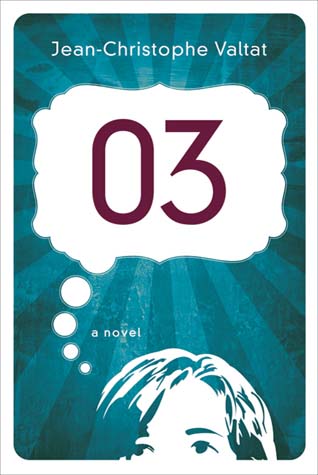
by by Margaret Kolb

Published by Farrar, Straus and Giroux, 2010 | pages
03 was French writer Jean-Christophe Valtat's English-language debut. It is a monologue in one 84-page paragraph, narrated by a writer looking back on his adolescence in a dispiriting French suburb, remembering his obsession with a mentally disabled girl he would see every day at the bus stop on his way to school.
03 is a study of the aching self-awareness of the adolescent mind. The young protagonist is a gifted student living in Montpérilleux, a self-perceived social and sexual failure who fixates on his self-thwarted infatuations. Precocious and self-conscious, he spends the bulk of the story enumerating his anger and suspicion at the "organized disaster called society": fearing the girl will fall prey to a pedophile; critiquing the French mental health system; railing against his peers, the educational process, and the labels we assign people. On a narrative level, the narrator himself, reflecting back on his disappointing and disappointed adolescent self, likewise muses in explorations of his dissatisfaction with the world. The girl becomes to him “an allegory […] of [his] own handicaps … of early promise thrown to the black pigs of Time.”
Some critics have panned the "half-baked philosophizing" of 03 . In fact, Hit seems to be just the point. The protagonist is a 12th grader. The same critique was made, most famously by The New York Times , against The Catcher in the Rye.
Valtat dramatizes his narrator's adolescent mind via the work’s structure and style, 03 unfolding in one unbroken succession of thoughts: thoughts interrupting other thoughts, thoughts revisited, thoughts modified, thoughts leaping forward into other unrelated thoughts. This weaving diction – glimpses of the narrator's memories, of his favorite music, of sensations of arousal, stirrings of anger at the world, at his parents, at anything – is written in a prose both verbose and concise. The sentences are long but never opaque, the effect recalling the mental zigzags of the brain just before sleep.
What makes this more than a typical adolescent crush is, of course, the girl’s mental disability. The work makes explicit that, in the narrator's interpretation, the element of taboo was one cause of the his youthful attraction. In his love for this small, vulnerable girl, the narrator, though less sinister, at times recalls Humbert Humbert, harping on her litheness in descriptions that recall Humbert's obsession with Lolita's nymph frame: her tiny underdeveloped body, how without clothes on she would simply disappear. Also like Humbert, our narrator was clearly drawn to her innocence: "Her chastity, to the negligible degree that it was under my control, suited me well since, instead of the complex chaos of action, I preferred the varied, more branching pathways of my dreams.”
03 negotiates this terrain of ambiguities and implications with great nuance. The narrator engages directly with his younger self’s engagement with taboo while simultaneously portraying it as (more or less) chaste. Over the course of the work, Valtat so intellectualizes the young boy’s desires that – more than a challenge to social norms – they come to be seen as a self-questioning about how similar he actually was to the girl: "[T]he more I wanted to identify with her," he says, "the more I identified with myself."
At times the book displays elements of Romanticism, albeit of a thoroughly contemporary variety. Like Holden Caulfield, Valtat's protagonist has a problem with phonies, against whom he contrasts the uncorrupted nature of his beloved. Compared to Caulfield, however, 03 ’s protagonist has a more mature, pronounced sense of self-awareness; he recognizes some phoniness in himself. Ostensibly, the work is about his infatuation with the girl at the bus stop, but in his deepest contemplations our (present day) narrator is seen as primarily self-involved. He concludes: "Hadn't I already begun to suspect that feelings, as with revolutions, the more spontaneous-seeming were actually the outcome of long and involved tactical maneuvers?" And yet this self-awareness is always only ever partial. Even as he admits to constructing his feelings, rather than experiencing them – saying his love is "only half there and only half felt" – his thoughts continue drifting back to the girl. This is the line 03 spans.
Ultimately, 03 resolves in a similar fashion to that of its narrator’s own self-analysis. It, like he, is principally engaged with society's discrimination against the developmentally disabled and inability to diagnose its own salient "disabilities" (sexual and social), resolving ultimately by stressing the arbitrariness of any attempts to privilege any state of being one over any other. In one moving passage our narrator, thinking of a clock in an empty room, relates: "That was how I felt about myself.’”
03 is a work of substantial formal innovation, and a lucid examinations of the role of normativity in contemporary society.
Erin Becker is an English teacher in Santiago, Chile, a graduate of the English and Creative Writing program at the University of North Carolina at Chapel Hill, and a native of Cedar Rapids, Iowa. Her interests include the relationship between propaganda and literature, writers during wartime, and contemporary media discourse.















click to see who
MAKE Magazine Publisher MAKE Literary Productions Managing Editor Chamandeep Bains Assistant Managing Editor and Web Editor Kenneth Guay Fiction Editor Kamilah Foreman Nonfiction Editor Jessica Anne Poetry Editor Joel Craig Intercambio Poetry Editor Daniel Borzutzky Intercambio Prose Editor Brenda Lozano Latin American Art Portfolio Editor Alejandro Almanza Pereda Reviews Editor Mark Molloy Portfolio Art Editor Sarah Kramer Creative Director Joshua Hauth, Hauthwares Webmaster Johnathan Crawford Proofreader/Copy Editor Sarah Kramer Associate Fiction Editors LC Fiore, Jim Kourlas, Kerstin Schaars Contributing Editors Kyle Beachy, Steffi Drewes, Katie Geha, Kathleen Rooney Social Media Coordinator Jennifer De Poorter
MAKE Literary Productions, NFP Co-directors, Sarah Dodson and Joel Craig